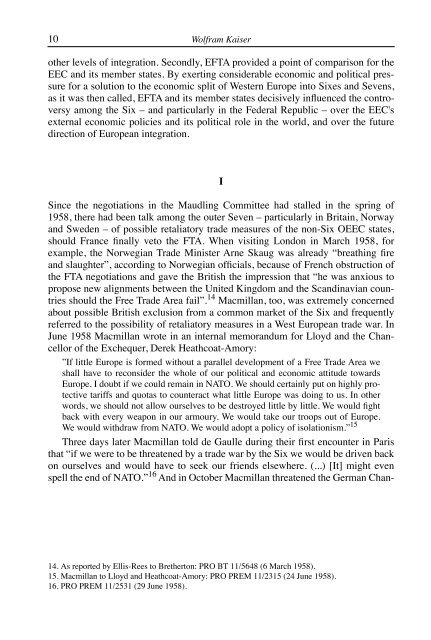Journal of European Integration History – Revue d'histoire de l'
Journal of European Integration History – Revue d'histoire de l'
Journal of European Integration History – Revue d'histoire de l'
- No tags were found...
You also want an ePaper? Increase the reach of your titles
YUMPU automatically turns print PDFs into web optimized ePapers that Google loves.
10Wolfram Kaiserother levels <strong>of</strong> integration. Secondly, EFTA provi<strong>de</strong>d a point <strong>of</strong> comparison for theEEC and its member states. By exerting consi<strong>de</strong>rable economic and political pressurefor a solution to the economic split <strong>of</strong> Western Europe into Sixes and Sevens,as it was then called, EFTA and its member states <strong>de</strong>cisively influenced the controversyamong the Six <strong>–</strong> and particularly in the Fe<strong>de</strong>ral Republic <strong>–</strong> over the EEC'sexternal economic policies and its political role in the world, and over the futuredirection <strong>of</strong> <strong>European</strong> integration.ISince the negotiations in the Maudling Committee had stalled in the spring <strong>of</strong>1958, there had been talk among the outer Seven <strong>–</strong> particularly in Britain, Norwayand Swe<strong>de</strong>n <strong>–</strong> <strong>of</strong> possible retaliatory tra<strong>de</strong> measures <strong>of</strong> the non-Six OEEC states,should France finally veto the FTA. When visiting London in March 1958, forexample, the Norwegian Tra<strong>de</strong> Minister Arne Skaug was already “breathing fireand slaughter”, according to Norwegian <strong>of</strong>ficials, because <strong>of</strong> French obstruction <strong>of</strong>the FTA negotiations and gave the British the impression that “he was anxious topropose new alignments between the United Kingdom and the Scandinavian countriesshould the Free Tra<strong>de</strong> Area fail”. 14 Macmillan, too, was extremely concernedabout possible British exclusion from a common market <strong>of</strong> the Six and frequentlyreferred to the possibility <strong>of</strong> retaliatory measures in a West <strong>European</strong> tra<strong>de</strong> war. InJune 1958 Macmillan wrote in an internal memorandum for Lloyd and the Chancellor<strong>of</strong> the Exchequer, Derek Heathcoat-Amory:”If little Europe is formed without a parallel <strong>de</strong>velopment <strong>of</strong> a Free Tra<strong>de</strong> Area weshall have to reconsi<strong>de</strong>r the whole <strong>of</strong> our political and economic attitu<strong>de</strong> towardsEurope. I doubt if we could remain in NATO. We should certainly put on highly protectivetariffs and quotas to counteract what little Europe was doing to us. In otherwords, we should not allow ourselves to be <strong>de</strong>stroyed little by little. We would fightback with every weapon in our armoury. We would take our troops out <strong>of</strong> Europe.We would withdraw from NATO. We would adopt a policy <strong>of</strong> isolationism.” 15Three days later Macmillan told <strong>de</strong> Gaulle during their first encounter in Paristhat “if we were to be threatened by a tra<strong>de</strong> war by the Six we would be driven backon ourselves and would have to seek our friends elsewhere. (...) [It] might evenspell the end <strong>of</strong> NATO.” 16 And in October Macmillan threatened the German Chan-14. As reported by Ellis-Rees to Bretherton: PRO BT 11/5648 (6 March 1958).15. Macmillan to Lloyd and Heathcoat-Amory: PRO PREM 11/2315 (24 June 1958).16. PRO PREM 11/2531 (29 June 1958).
















